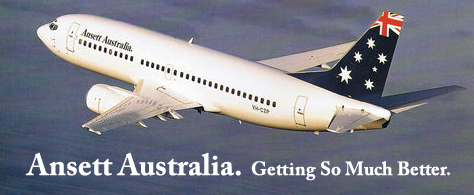Jingle: Ansett “Getting So Much Better” (1991)

[sc_embed_player fileurl=”http://brandedskies.com/wp-content/uploads/2012/11/gettingbetter120.mp3″ title=”Ansett Australia: “Getting So Much Better””]
The tumult of deregulation didn’t spare Australia, but it did arrive somewhat later. It was not until October 31, 1990, that Australia’s skies were deregulated. By then Australian airlines had seen enough of the experiences of other countries around the world to be nervous. The sleepy domestic duopoly that was Australian aviation went to war. Advertising was one of the battlefields.
For years, by government policy, just two airlines dominated domestic routes in Australia: government-owned Trans Australia Airlines (later Australian Airlines) and privately owned Ansett Australia. The regulated market protected the carriers from competing on price or route structure.
So when the government of Bob Hawke announced the end of regulation, it must have been very worrying. The anxiety only heightened when the government announced, just shortly before deregulation was to go into effect, that it also planned to privatize Australian Airlines and Qantas (the government-owned international carrier.) The entrance of a new airline, Compass, also threatened the status quo.
So Ansett took decisive action. In August 1990, they sacked their advertising agency, The Campaign Palace, and hired John Singleton Advertising. Their first television spot was dramatic: a 1984 for the airline industry. A slouch-hatted Australian woman shatters the chains encumbering an Ansett A320 — even though Ansett surely benefitted from the regulated market as much as anyone. The jingle from the spot reminds me of The Song That Goes Like This. Reach for the stars? It’s reaching for something, all right.
But the jingle that is the subject of this post owes less to overwrought musical theatre than to The Supremes—you can tell the agency gave the music house “You Can’t Hurry Love” as a reference. “Getting So Much Better” comes from November 1991, a year after deregulation.
It was a busy 12 months for Ansett. Rather than reinventing itself as a low-cost carrier, as industry analysts had expected, Ansett focused on becoming a “world-class airline.” It won awards. It expanded its routes internationally. And at first it seemed to work. “The airline’s efforts to bolster customer satisfaction have paid off,” noted an article written five years after deregulation and six years before Ansett went bankrupt.
I haven’t seen the spots, but according to a contemporary media report, they feature a businessman blowing a business deal while enjoying Ansett’s facilities on the ground and in the air. “In choosing this approach the carrier hopes to demonstrate to passengers and businessmen that it understands that not everything goes smoothly in business but that it is there to help,” notes the article.
The launch of the new advertisements follows research conducted by the carrier during the late 1980s and in the lead-up to last year’s deregulation which showed it had a poor public image and was perceived as being arrogant. Ansett decided that before it started promoting its product it should first improve it.
Libby Moffet, “Ansett approach means business,” Australian Financial Review (12 November 1991)
The relationship between John Singleton Advertising and Ansett was apparently rocky from the start
Singleton may have had the last laugh, though. In 1995, the same executive who fired them at Ansett hired them at Qantas.
Airline: Ansett Australia
Title: “Getting So Much Better”
Agency: John Singleton Advertising, Sydney
Written By: Unknown
Year: 1991
Lyrics:
There’s been some changes
and it’s time to say
we’re getting better.
A little better every day.
Yes, we’re getting better
in each and every way.
Just take a look around.
We’re getting better every day.
We won’t stand still.
That’s no way to stay.
We’re getting better.
We’re getting better every day.
Yes, we’re getting better
in each and every way.
Just take a look around.
We’re getting better every day.
We’ve been around for quite a while.
But there’s always something new
that we’d like the chance to share with you.
There’s been some changes
and it’s time to say
we’re getting better.
A little better every day.
We won’t stand still.
That’s no way to stay.
We’re getting better.
Yes, we’re getting better every day.
Getting better.
So much better.
Getting better.
So much better.
Getting better…
So much better…

I have located a copy of the 7-inch single of the song (2min version on one side, 60sec version on the other, pressed on blue vinyl). Writing credit for the song goes to John Singleton. But I blame Phil Collins, whose version of ‘You Can’t Hurry Love’ went to no. 3 in the Australian charts in 1982.
Posted by domromeo on 26 February 2016 at 11:43 pm
Yep, it’s hard to miss the similarities. I’m sure “You Can’t Hurry Love” was a reference.
Posted by Fly the Branded Skies on 29 February 2016 at 11:21 am